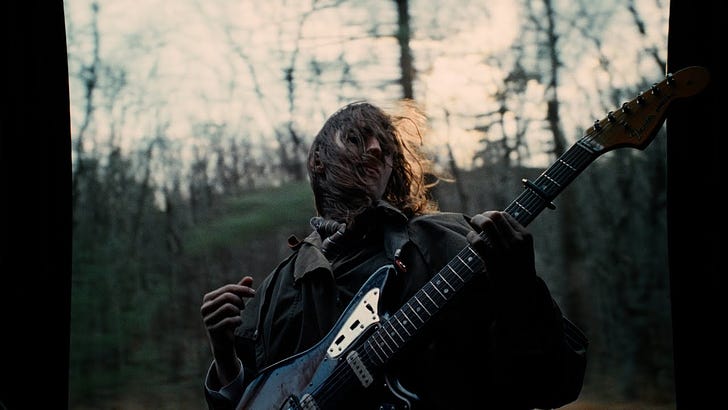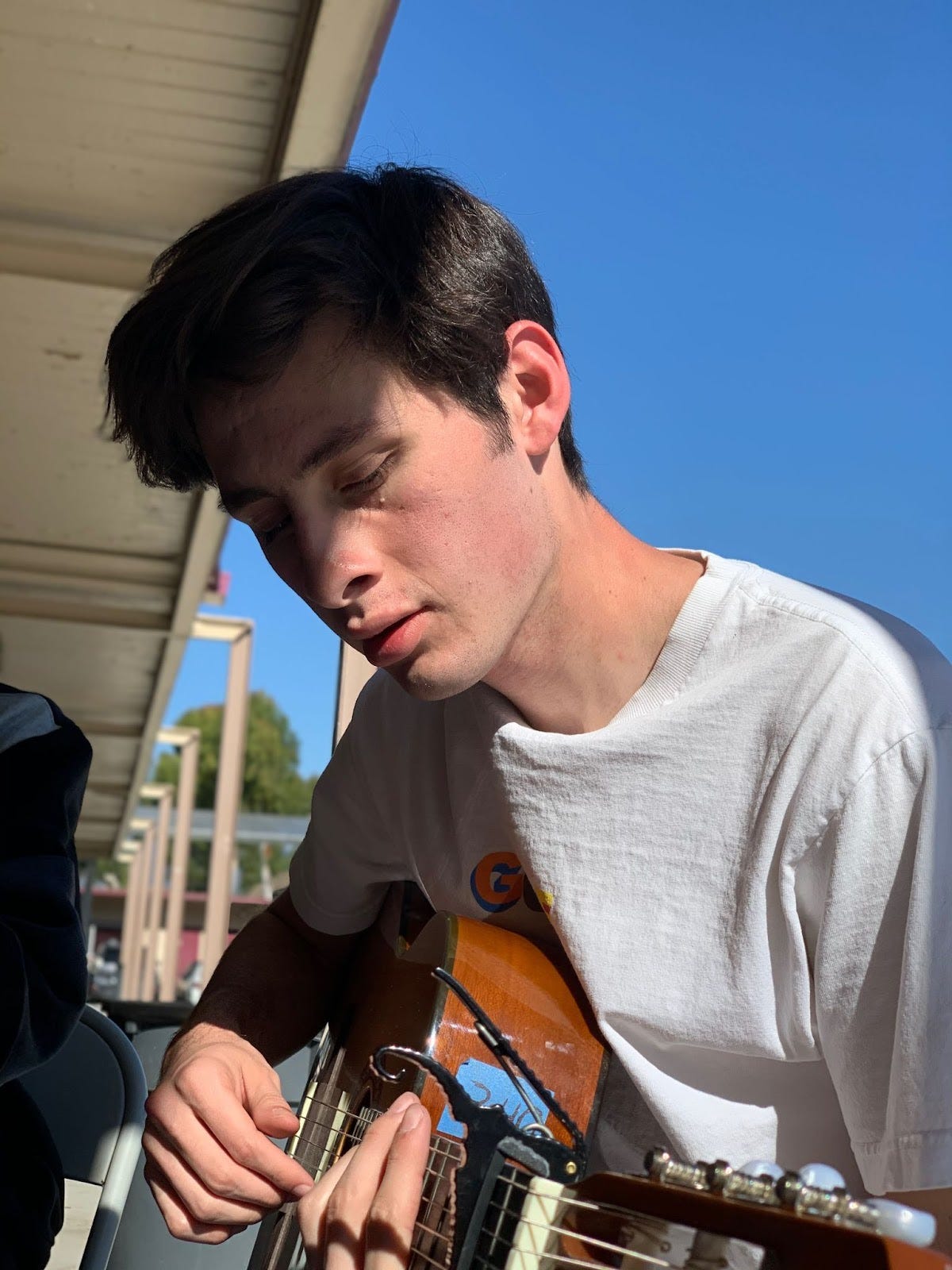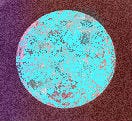What is a ‘real’ artist?
Reflections on making music and the power of Mk.Gee. ---Written by my friend, Sebastian.
I have never considered myself a 'real' musician. Although I have been playing instruments and singing for almost a decade, I find it difficult to consider myself so. But why? What even is a 'real' musician? What is a 'real' artist?
For much of my life I have felt somewhat alone in my creative growth. In my teens, I began learning to play guitar. A cheap classical guitar from Ebay became my new fixation. I taught myself through YouTube tutorials and sketchy websites in the absence of a teacher. My initial interest was to impress a girl I had a crush on. That never panned out. I always recount these origins, especially because I am grateful to have kept with this passion. What started as an act of romance became so in a different way: I fell in love with making music.
I was the only person I knew who was learning to play guitar. Sure, I had access to thousands of people online who did, but there was no one around to share my passion. Whatever I played for my family they praised, even when I played horribly out of tune and time. I had always wished for a friend that I could make music with, and although I would eventually meet one, I developed a sense of isolation when creating music.
Around this time I also became interested in production. The ability to construct a world of sound was incredibly attractive, especially as my knowledge of music grew. It was in this period that I had my first realization of what I was doing. I had opened up a painfully old version of Audacity (a popular audio editor) on my computer and loaded "Suit & Tie" by Justin Timberlake and Jay-Z. After fiddling with the interface, I ended up reversing and pitching up the song. It was a crude attempt at producing, but in that moment I thought to myself:
“I'm a producer now, I am an artist.”
It was the first time that I felt this way. Since then I have kept chasing this feeling because, at my core, I haven't considered myself an artist.
Quite early on I faced a particularly traumatic rejection of my art. As I kept learning to produce, I decided to write and record a mixtape. I was particularly inspired by artists like Odd Future and Childish Gambino who had come to capture the music moment. I found a few fan-made instrumentals of their songs on YouTube and put them into a shitty software. I wrote and recorded about 8 songs, none of which were particularly well-mixed or performed, but that didn't matter. The music was what I wanted to make.
I uploaded them to SoundCloud and started posting all over my Instagram and telling my friends. After a lack of response, I concluded no one had listened and was just about to move on. Then, during a lunch period, a friend came up and told me something I would never forget.
Somehow, a group of people from my middle school heard that I released my mixtape at a party and decided to play it on their speaker. What followed was a complete rejection of my music. Supposedly everyone thought it was so bad that they couldn't stop laughing and turned it off after two songs. The art that I had worked so hard to create, that I had cared so much about, had been torn to pieces. Shortly afterwards I stopped making music. It would take a few years before I would try again.
By this point, if you are still reading, I am sure you’re wondering how this fits into my original question (don't worry we're getting there) but I promise it's relevant. To answer this question, I feel it's productive to honestly establish my experience. These events greatly influence how I think about myself and my art. From here, I'll speed up a bit.
During high school, I decided to revisit my passion. I finally met friends who wanted to make music and formed a band. We worked together for a bit, but eventually, it faded with the pandemic. One of the members and I stayed together, continuing our shared passion for songwriting. Together we formed PEARS18, our band. I would be remiss to not acknowledge his contributions, pushing me to rethink how I approach every piece of the music process.
Yet, even with this creative support system I still felt on my own. I became the sole producer and instrumentalist. It was my responsibility to lay the foundations for our songs. I had to continue learning what I could from the internet. My music-making skills are derived almost entirely from unorganized viewing of YouTube tutorials. Everything I have made is DIY, something I'm glad to share with hundreds of others who have done the same.
However, I came to develop expectations for myself in making music Especially as I obsessed over genius artists. I would constantly judge myself:
“These chords aren't interesting enough. This strumming is too basic. The drums are too bland. The samples carry the song. The effects are stale. The mix is terrible.”
These judgments hit their peak with a rejection of my previous realization:
“I am not a musician. I am not good enough. I am not a ‘real’ musician.”
I have recently considered, though, how I was wrong to think this way. Particularly with the help of one of my new favorite artists, Mk.Gee.
So, what is a 'real' musician? If Mk.Gee is any indication, it is someone who makes art for the love of it, irrespective of someone telling them they're wrong. Much of my self-judgment hinged on the fact that people could decry me as inauthentic. I imagined countless ways I could be discredited but never considered that in loving what I create I am authentic.
Mk.Gee's work has been especially inspiring for his reshaping the rules of music making. He beautifully plays a baritone Jaguar through a 4-track cassette recorder, his vocals decentered from the mix, and creates such intriguing atmospheres. His work inspires me to abandon all doubt I have of myself. I am a musician, whether people say I am or not.
Where his work truly shines is his fearlessness in creating new sounds. Unlike other artists, he finds a way to transform traditional instruments until they are almost unrecognizable. Just listen to his performance of "Are You Looking Up" and you'll find yourself stunned he can create such distinct and weird sounds with a guitar:
So, what should we make of doubt, of ‘real’ artists? The idea of inauthenticity, in my view, is one which has come to exist as a product of the digital age. Unlike any time before, there is immediate accessibility to creating and sharing music with others. While an empowering notion to some, for others it has come with costs. Namely, that artists don’t need talent anymore, that they can be ‘fake’ artists.
While critiques are warranted for inauthentic characters in music, I think this sets a harmful precedent. If the goal is to police inauthenticity, what good does attacking artists actually do? I argue it does more harm than good, that given an artist creates truthfully, they are authentic. So what if they use samples, autotune, or backing tracks? If an artist is honest, it will reflect in their art irrespective of their tools. To be a ‘real’ artist, put simply, is to be honest about your art.
Retracing my steps with this problem is thus an act of truth. In fact, I now find myself reconsidering everything I know about music, but especially myself. The doubt which prevents myself, and many others, from artistic expression can be overcome. One only needs to commit to loving their art. Creating honestly, to me, is the only way to be an artist.
Thank you for reading. I hope you take some inspiration from my reflections, and that you also become a Mk.gee fan. My gratitude to Arantza, for allowing me a place in this wonderful Substack.
- sebastiÁn
Extra
the weird competition on authenticity and comparing artists side by side in their depth is so ridiculous to me. many use this argument to look down on pop artists who don’t seem to have depth but it is just a different spectrum of authenticity. it’s the approach, and the idea of a “real artist” only comes from those brave enough to be themselves unapologetically. It might even be a cultural priority these days as artists like Chappell Roan and Ethel Cain become mainstream and adored when they would’ve been bashed a couple of decades ago. authenticity is praised and aspirational in an age of trends.
Thank you Seba for putting in the time and effort to make this post. It was a great read and I love being able to have a collaborative space for music fans and lovers who want to find a sense of community through writing.





